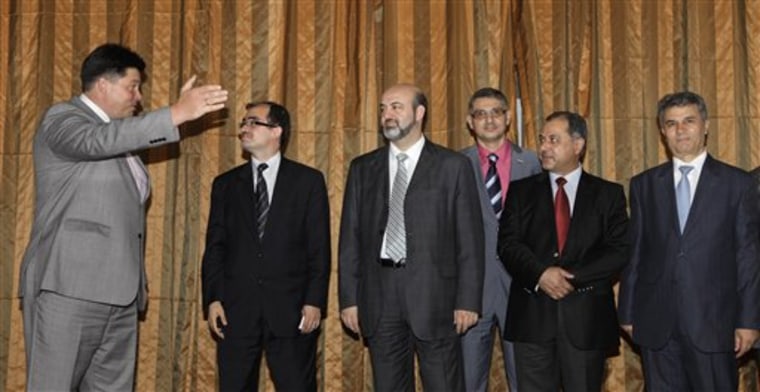A Russian envoy told Syrian opposition members Tuesday that "leaders come and go" — an apparent signal to Syrian President Bashar Assad that he cannot count on his ally's unconditional support after months of protests demanding his ouster.
It remains to be seen, however, if Mikhail Margelov's comments indicated a change in Moscow's opposition to tough U.N. action on Syria for Assad's bloody crackdown on his opponents.
"Leaders come and go, politicians come and go, social systems come and go, but for Russia there remains a single reliable and trusted friend: the Syrian people," Margelov told a Syrian delegation in Moscow, calling for an end to "any and all forms of violence."
U.S. notes progressThe United States said Tuesday that Syria's move to allow activists to meet to discuss political change was a positive step but that the government needed to do more to launch real reforms.
Some of Syria's leading intellectuals used Monday's meeting to call for sweeping political change, and the government announced it would invite opposition figures to July 10 talks to set the framework for a dialogue promised by President Bashar al-Assad.
"The fact that opposition members were allowed to meet in Syria for the first time in decades, as I understand it, is progress and is something that is new and is important for the democratic process in Syria that we all want to see," State Department spokesperson Victoria Nuland said.
Nuland said that U.S. Ambassador to Syria Robert Ford, who had sought unsuccessfully to contact top Syrian officials after the protests began, was now communicating with close Assad advisers and had urged them to allow the activists' meeting to take place.
"Over the last 10 days doors have been more open among the people around Assad," Nuland said.
Many opposition figures reject Assad's call for dialogue as insufficient and some activists refused to take part in Monday's conference, saying it could be exploited by authorities while mass killing and arrests continue.
Toll from protestsThe opposition estimates that 1,400 people have been killed as Assad tries to crush a pro-democracy movement inspired by successful uprisings in Egypt and Tunisia.
The regime disputes that death toll, saying that security forces have been the victims of "armed thugs" and foreign conspirators behind the unrest.
It is nearly impossible to independently verify the claims on either side, although witness accounts from thousands of refugees streaming out of Syria tell of a brutal government response to protests. Syria has banned most foreign journalists and restricts coverage by reporters inside the country.
The U.N. Security Council has yet to adopt a draft resolution initiated by France, Britain and Germany that would condemn Syria for its crackdown on protesters and demanding an immediate end to the violence. Russia and China — both veto-wielding members of the body — oppose the motion.
The situation in Libya, which threatens to become a protracted stalemate, has sapped some of the willingness to get involved in the Middle East's roiling conflicts.
Russia takes harder lineStill, even Russian Prime Minister Vladimir Putin has taken a harder line on Assad as international pressure mounts for the Syrian leader to accept major political change.
"We need to apply pressure on the leadership of any country where massive unrest, and especially bloodshed, is happening," Putin said in Paris last week. "In the modern world it is impossible to use political instruments of 40 years ago" — referring to the Syrians' tactics.
The leader of the Syrian delegation, Radwan Ziadeh, was satisfied with the Margelov meeting.
"This is exactly what we are looking to hear from the Russian officials," said Ziadeh, a prominent Syrian exile and a visiting scholar at the Institute for Middle East Studies at George Washington University.
"We call upon Russia to use its leverage on the Syrian regime to stop the killings done by the Syrian security apparatus," he said. Russia must send "a clear message that this is not acceptable."
A harder line from Russia would be a blow to Syria, which relies heavily on Russian military equipment and has long-standing ties to Moscow. Syria was heavily dependent on economic and military aid from the former Soviet Union during the Cold War.
In the mid-2000s, Putin was quoted as saying Russia would re-establish its place in the Mideast via "the Syria route" — that is, by strengthening ties with Damascus.
A united frontThe trip to Moscow comes as Syria's opposition tries to form a more unified front to counter Assad. The president — and his father before him, the late President Hafez Assad — silenced, imprisoned or drove into exile anyone who dared criticize the ruling elite over the past four decades.
In an attempt to appease the protest movement, which Assad acknowledges has "legitimate demands for reform," the president allowed nearly 200 critics of the regime to meet Monday in the Syrian capital.
The group declared its support for a popular and peaceful uprising, and warned that the country might be destroyed otherwise.
But some activists complained the government-sanctioned gathering was being exploited to give legitimacy to Assad's regime as it continues to kill protesters.
